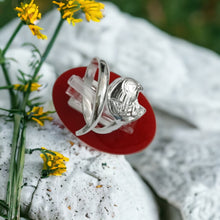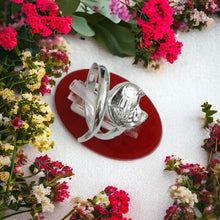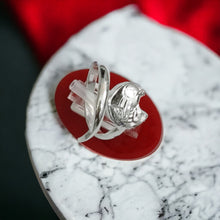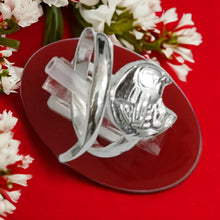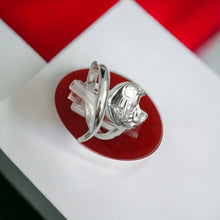
The Silver God Horus Adjustable Ring blends ancient Egyptian symbolism with modern craftsmanship, featuring the falcon-headed deity Horus, symbolizing protection and power. Inspired by the rich history of ancient Egypt, this ring is a timeless piece that merges tradition with contemporary style.
- History: Ancient Egyptian symbol of protection and power
- Spiritually: Associated with the god Horus, embodying divine authority and protection
- Talisman: Believed to ward off negative energies and bring blessings
- Handmade: Crafted with care, each piece unique
- Healing: Thought to promote mental clarity and emotional balance
- Material: Sterling silver, valued for its purity and durability
- Symbolism: Eye of Horus represents insight, wisdom, and protection
- How to Wear: Adjust the ring to fit comfortably on your finger, wear with intention for spiritual connection and personal empowerment.
History Side For Those Who Are Interested
Horus, one of the most significant deities in ancient Egyptian religion, is emblematic of kingship, protection, and the sky. His history spans millennia, intricately woven into the fabric of Egyptian mythology and culture.
The origins of Horus trace back to the prehistoric times of predynastic Egypt, possibly as early as the late Paleolithic period. Initially, he was revered as a sky god, representing the celestial realm and its infinite expanse. Over time, as Egypt's political landscape evolved, Horus became closely associated with kingship and pharaonic authority.
The mythological narrative surrounding Horus is complex and multifaceted, with various regional variations and interpretations. One of the most enduring myths revolves around the conflict between Horus and his uncle Set, the god of chaos and disorder. According to the myth, Set murdered Horus's father, Osiris, and usurped the throne of Egypt. Horus, determined to avenge his father's death and reclaim his rightful inheritance, engaged in a protracted struggle with Set.
In the mythological battles that ensued, Horus demonstrated his prowess as a warrior and his unwavering commitment to justice. He symbolized the triumph of order over chaos, righteousness over evil, and the rightful succession of kingship. Ultimately, Horus emerged victorious, vanquishing Set and restoring harmony to the cosmos.
Horus's association with kingship was further solidified by the concept of the "divine kingship," wherein the pharaoh was regarded as the earthly incarnation of Horus. This belief underscored the divine mandate of the pharaoh to uphold Ma'at, the cosmic order, and to ensure the prosperity and stability of Egypt.
Throughout Egyptian history, Horus was venerated in various forms and epithets, reflecting his multifaceted nature. He was depicted as a falcon-headed deity, symbolizing his connection to the sky and his role as a celestial guardian. Additionally, Horus was often depicted wearing the double crown of Egypt, signifying his dominion over both Upper and Lower Egypt.
Horus's cult spread throughout Egypt, with numerous temples and shrines dedicated to his worship. He was invoked in rituals and prayers for protection, prosperity, and divine guidance. His cult reached its zenith during the New Kingdom, when he was revered as a national deity and the patron of the pharaoh.
Beyond his role in mythology and religion, Horus also held significance in Egyptian art, literature, and symbolism. His image adorned temple walls, sarcophagi, and amulets, serving as a potent symbol of divine power and protection.
Even after the decline of ancient Egyptian civilization, the legacy of Horus endured, influencing subsequent cultures and religions. Today, he remains an iconic figure in the pantheon of Egyptian gods, embodying the timeless ideals of kingship, justice, and cosmic order.













